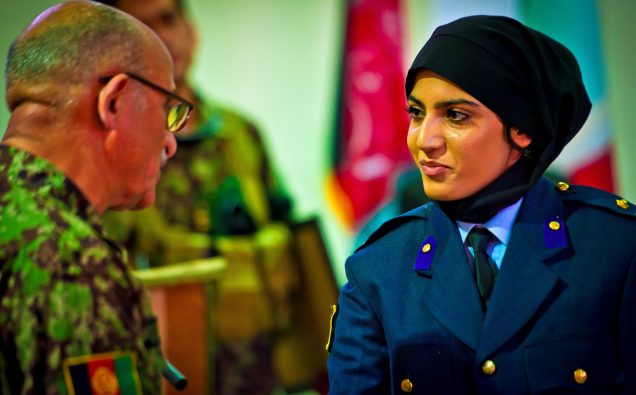
Nilofar Rahmani accepting her pilot wings at a ceremony in May 2013 Photo Credit: Senior Airman Scott Saldukas US Air Force via Wikimedia Commons
Capt. Nilofar Rahmani, the first female pilot in the Afghan air force, has formally requested asylum in the United States over fears for her safety, her lawyer said.
Kimberly Motley, Rahmani’s lawyer, told CNN Rahmani has received death threats from insurgents and condemnation from Afghan government officials. She has been training at air bases in the United States for the past year and most recently completed training in Little Rock, Arkansas.
Motley revealed that Rahmani’s family has relocated several times due to death threats.
“If she were to return to Afghanistan, she would be in fear of her safety,” Motley said.
According to news accounts, Rahmani, 25, became Afghanistan’s first fixed-wing pilot in 2013. She received the U.S. Department of State’s International Women of Courage Award in 2015, when she was praised by U.S. first lady Michelle Obama.
“Rahmani is as committed to encouraging other young women to follow in her footsteps now as she was as an 18-year-old dreaming of flight school,” Obama said during a ceremony.
Rahmani aspires to continue flying if her asylum request is granted — either as a commercial pilot or for the U.S. Air Force.
“I would love to fly for my country — that is what I always wanted to do. But I’m scared for my life,” Rahmani told The Wall Street Journal.
According to a story in The New York Times, she stands for encouraging women around the world to strive for their uplift.
“I would just want to encourage all of the females around the world, especially in my country where the females have no rights, to just believe in themselves and to have more self-confidence,” Captain Rahmani told a military journalist in 2015.
Captain Rahmani told the Times that she sees the United States as a place where women can aspire to accomplish great things.
However, she doesn’t believe that to be true of Afghanistan at the moment.
“Pursuing pathbreaking goals in today’s Afghanistan as a woman is futile, she said. “It’s better to keep it as a dream and not let it come true,” she said on a despairing note.
Although Afghanistan has made a lot of progress in terms of girls’ access to education since US engagement in 2001 from a low base of almost no existing educational facilities. But the deeply conservative elements of the society are not willing to allow women enjoy freedom and constitutional rights. In fact, many government officials in Afghanistan are pretending to doubt Captain Rahmani’s account.
With a continuing Taliban insurgency and political infighting, the country still faces a fragile future despite international development commitments.

















